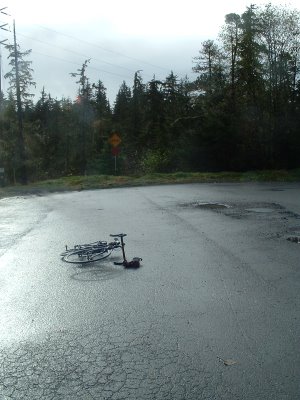 Date: Oct. 21 and 22
Date: Oct. 21 and 22Total mileage: 49.4
October mileage: 319.1
Temperature upon departure: 43
I should be a weather guesser. Predicting the weather in Juneau would be my easiest job since I worked as a hamburger bun warmer at Wendy's. Why, just now, I pounded out a 195-day forecast that should get us through May 6, 2007. I'm betting on 75-percent accuracy, which is a better average than the NOAA. Our current weather guessers wouldn't dare put out such a report - they probably can't deal with the bleakness of reality. But, I gotta tell you, that one day of partial sun is worth living for.
I installed fenders on my road bike about a week ago, and I was happy to discover that they do in fact dispel road grit with about 95-percent accuracy. It's also nice to have water continuously splashing on me from only one direction - the sky. Someday they'll invent fenders to combat that pesky precipitation problem. Until then, I'll just have to rely on a marginal rainsuit and a helpfully high tolerance for wet feet.
It would be interesting to hold a vote for the absolute worst cycling weather. Although I enjoyed today's ride, I'd have to nominate 35-40 degrees and raining. I've experienced a range of conditions ... -11 degrees and windy, 18 degrees in a blizzard, 107 degrees with heat waves wafting off the pavement. On second thought, -11 degrees and windy is probably worse. But 40 degrees and raining would at least be a close second. There's just about nothing you can do to stay warm, except ride hard - and even the slightest cooldown will make you uncomfortable for miles. It's a challenge. It really is.
But that could just be me, watching my wet wool socks and leggings drip gray water all over the carpet and feeling compelled to gripe about it. What's the worst weather you've ever ridden in?







